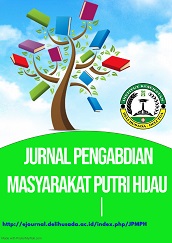COUNSELING ON THE IMPORTANCE OF IMPROVING MOTHERS' KNOWLEDGE ABOUT NUTRITIONAL STATUS TO REDUCE THE INCIDENCE OF STUNTING AT THE DELI TUA COMMUNITY HEALTH CENTER
Abstract
A number of variables contribute to stunting in children. Family and household factors, the administration of breast milk (ASI), the administration of complementary food for breast milk (MP-ASI), and a history of infection are the factors that induce stunting, according to the World Health Organization (WHO). The mother's ignorance regarding healthy eating and lifestyle choices is one of the related family issues. Stunting in children can be caused by a multitude of things. The World Health Organization identifies a history of infection, conditions within the home and family, the availability of breast milk (ASI), and the provision of supplemental foods (MP-ASI) as the causes of stunting. When it comes to diet and health, one of the family aspects that matters is moms' lack of information. By educating themselves on the signs, consequences, and preventative measures of stunting, mothers may help keep their children healthy and so lower the preval_ence of the condition.
Stunting rates at the Deli Tua Community Health Center are statistically related to mothers' levels of education and their awareness of their children's nutritional status.
The Deli Tua Community Health Center has the potential to enhance the utilization of posyandu and train cadres to combat stunting, with the aim of highlighting the importance of IEC in this respect. The Community Health Center is expected to play a crucial role in educating the community, particularly mothers, on stunting prevention and treatment. Mothers whose toddlers are stunted should make an effort to improve their own nutrition and way of life, and they should also seek out more information about stunting.












